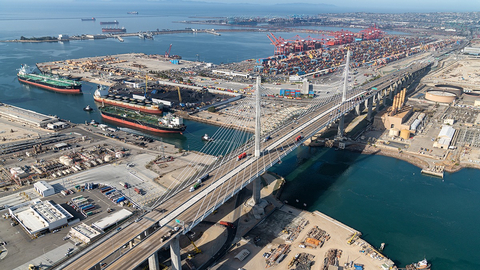
Alsym Energy Partners With Synergy Marine to Provide Low-Cost, Non-Flammable Rechargeable Batteries for Shipping Vessels
Published by Todd Bush on July 20, 2022
July 20, 2022 06:00 AM Eastern Daylight Time
WOBURN, Mass.--(BUSINESS WIRE)--Alsym™ Energy, a developer of next-generation rechargeable batteries, today announced that Alsym and Synergy Marine, in collaboration with Nissen Kaiun, Japan, will jointly develop applications specific to the marine shipping industry using Alsym's high-performance, low-cost technology. Singapore-based Synergy Marine is a leading global ship management services provider, currently managing more than 500 vessels.

Synergy Marine Group plans to use Alsym Energy batteries on many of its ships, which dock at ports around the world, including the Port of Long Beach, pictured here.
>> In Other News: FlexGen Announces $100 Million Series C to Power Continued Growth
Greenhouse gases from ships are predicted to make up 17% of total global emissions by 2050 if the industry does not accelerate efforts to electrify. Port operations generate substantial amounts of air pollution—up to half of total emissions in some metro areas—and some ports now require ships to use high efficiency fuels and observe speed limits within 20 miles of shore, while others have banned the use of auxiliary diesel generators while docked.
Alsym will provide Synergy and Nissen Kaiun with 1 gigawatt of batteries per year for three years starting in the company's first year of high-volume production, conditional on the battery systems meeting key performance levels and regulatory requirements specific to cargo ships and tankers. Alsym's batteries may be used to propel cargo ships and tankers as they enter and leave port, power berthed ships, and support peak shaving applications at sea. The company plans to start pilot manufacturing its non-flammable batteries for EVs, ships, and stationary storage later this year at its facility in Massachusetts, with high-volume production expected to follow in 2025.
'Zero-emission vessels are the future of maritime shipping, and we're working with like-minded owners, including Nissen Kaiun, to decarbonize every part of the ecosystem as quickly as possible,' said Captain Rajesh Unni, Founder and CEO of Synergy Marine Group. 'By lowering the cost of electrification and minimizing the risk of battery-related fire events, Alsym's technology is well-placed to be a safer alternative that can help the shipping industry meet its goal of zero net emissions by 2050—especially in light of the European Commission's recent proposal to classify lithium as toxic.'
By using low-cost, inherently non-flammable raw materials with robust global supply chains, Alsym's aims to provide batteries at a fraction of the cost of lithium-based technologies, making electrification both safe and economically viable. These batteries can help reduce risks to crew and cargo, as well as lower insurance costs for fleet managers and shippers.
'Synergy Marine is on the cutting edge of technology in the maritime sector, and we're honored to be part of their journey to work with owners in their transition away from fossil fuels,' said Mukesh Chatter, President and CEO at Alsym Energy. 'By manufacturing batteries from low-cost, readily available materials that are inherently non-flammable and non-toxic, we're providing an economically-viable way to help them decarbonize while also lowering operating expenditures and insurance costs associated with lithium and cobalt-based battery technologies.'
About Alsym™ Energy
Alsym Energy is a leading developer of advanced low-cost, high-performance rechargeable batteries made from readily available materials that are inherently non-flammable and non-toxic, providing an economically viable alternative to lithium-based technologies. The company is focused on commercial development and mass production of batteries for use in applications including passenger electric vehicles and two-wheelers, marine shipping, and stationary energy storage to enable a zero-carbon future. To learn more, please visit www.alsym.com.
About Synergy Marine Group
Headquartered in Singapore, Synergy's hallmarks are its through-life approach to asset management and ability to develop custom-designed thought partnership strategies with leading owners. Spanning across a network of 25 offices in 13 countries and employing more than 18,000 seafarers, Synergy manages a fleet of over 500 vessels including the most complex LNG (including FSUs), LPG and vast 20,000+ TEU container ships, as well as oil and chemical tankers, car carriers and bulk carriers. With a strong focus on crew wellbeing, digitalization and environmentally responsible policies, Synergy is at the forefront of transforming the ship management industry. For more information visit www.synergymarinegroup.com.
Subscribe to the newsletter
Daily decarbonization data and news delivered to your inbox
Follow the money flow of climate, technology, and energy investments to uncover new opportunities and jobs.
Latest issues
-
Can Koloma Crack Iowa's Billion-Year-Old Secret?
Inside This Issue ⛏️ Iowa's Hydrogen Rush: Can Koloma Strike Gold Before Rules Kick In? ✈️ Bentley Commits to Use 100% Sustainable Aviation Fuel for Car Airfreight 🌬️ Minister Parrott Provides Upd...
-
$47M Just Poured Into This SAF Producer
Inside This Issue 💰 LanzaJet Announces $47M in New Capital and First Close of Equity Round at $650M Pre-Money Valuation 🚢 Maersk's Ethanol Bet Could Reshape U.S. Fuel Markets 🪨 Canada Nickel and t...
-
Kita's $29M Bet Signals Carbon Insurance Is Here
Inside This Issue 🛡️ Kita's $29M Bet Signals Carbon Insurance Is Here 🏗️ CCI BioEnergy Selects Arcadis As Design-Engineer Partner Under Master Service Agreement 🤝 Tapestry and Climeworks Announce ...
Company Announcements
-
Climeworks Establishes Canadian Headquarters in Calgary
Calgary, Alberta, February 20, 2026 — Climeworks, a global leader in commercial carbon removal, has established its Canadian headquarters at Calgary’s ETC, one of Alberta’s leading hubs where start...
-
MIAMI, Feb. 24, 2026 /CNW/ - Power Sustainable Infrastructure Credit ("PSIC") recently closed an $85M senior secured financing for Sagepoint Energy ("Sagepoint"), a vertically integrated renewable ...
-
HALIFAX, NS, Feb. 24, 2026 /CNW/ - The Nova Scotia Salmon Association (NSSA) is celebrating a significant advancement in climate action and watershed restoration as Royal Bank of Canada purchases a...
-
Honeywell International: Process Technology to Help Verso Energy Accelerate eSAF Production
CHARLOTTE, N.C., Feb. 24, 2026 - Honeywell today announced that Verso Energy, an integrated energy company focused on producing low-carbon molecules, will use Honeywell UOP's eFiningTM methanol-to-...